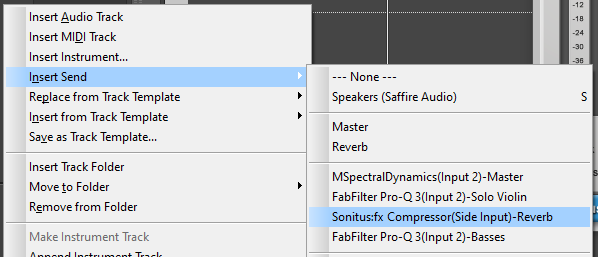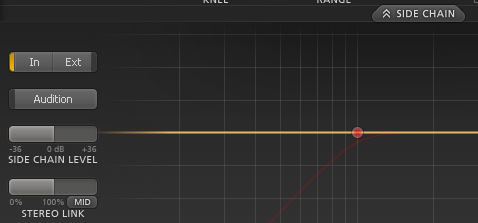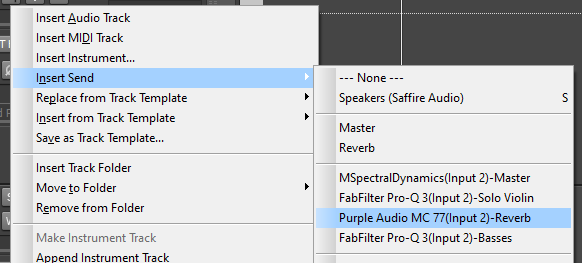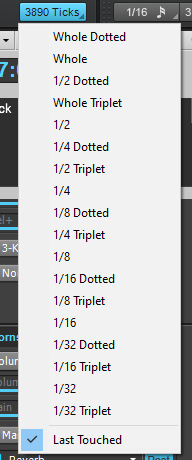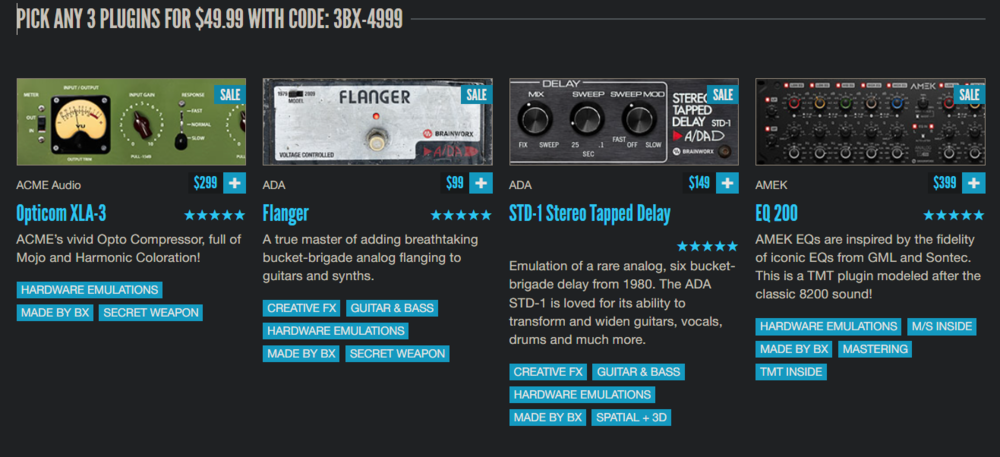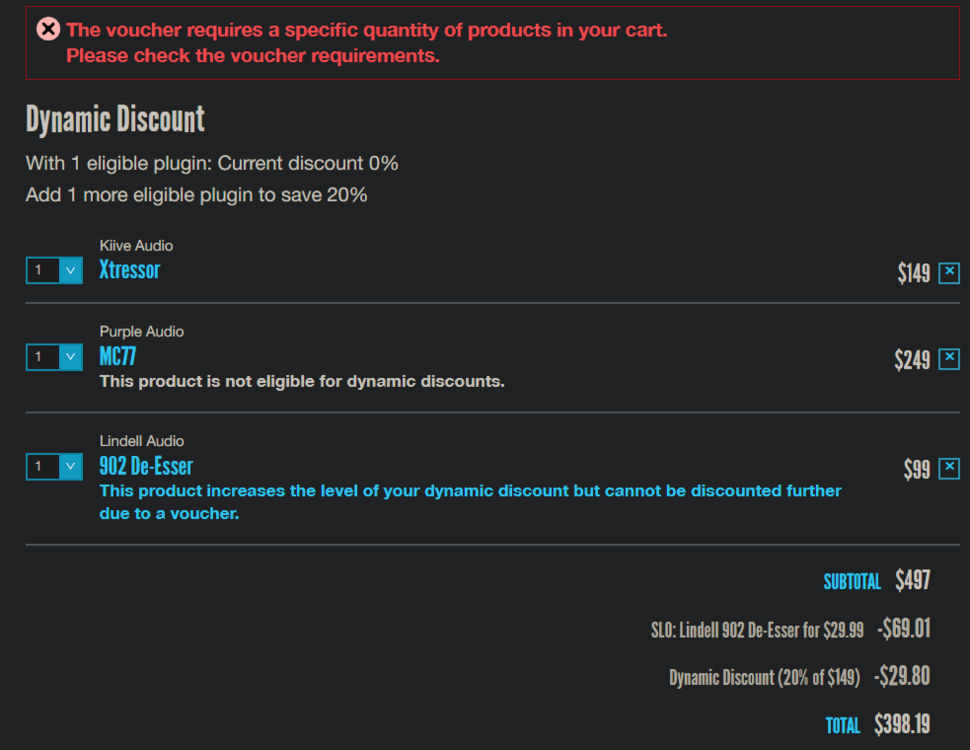-
Posts
3,371 -
Joined
-
Last visited
-
Days Won
22
Everything posted by bitflipper
-

Can anyone help me work out this sidechain technique?
bitflipper replied to kevmsmith81's topic in Cakewalk by BandLab
It works with the Sonitus compressor. In fact, it's excellent for this application because of its bouncing-ball visual aid. But you do need to set the compressor's threshold, ratio, attack and release correctly to get the result you're after, which is to duck the reverb in response to the vocal so that the reverb tail ringing out from the previous vocal phrase gets turned down. Depending on your settings, this can be a subtle effect, a drastic effect, or anything in between. If you're using something other than the Sonitus compressor, it's likely you will have to explicitly tell the compressor to get its sidechain information from an external source. This isn't necessary with the Sonitus compressor. All you have to do is make sure your Send is routed to the compressor's sidechain input. TBH, I don't know how the Sonitus comp pulls this off. It must automatically disengage the internal sidechain when something is routed to its external sidechain. Most compressors I have require switching between internal to external sidechain before this technique will work. A few don't support external sidechain at all. For example, with FabFilter Pro-C you have to expand the sidechain section and click the In/Ext button to Ext. Some compressors do a good job of hiding the external sidechain switch. But if you can't find it, look at the available Send destinations because Cakewalk will know if the compressor supports external sidechaining. Note that the destination may be labeled "Input 2" instead of "Sidechain" or "Side Input". -
Before diving into the can of worms that is bridging 32-bit plugins, the easiest solution - assuming it's an option - is to stick to 64-bit versions of plugins and avoid the whole mess. Is there a 64-bit version of the plugin available?
-
Select the clip(s), go to Process -> Transpose and enter the number of semitones to shift the pitch.
-
Well, from mettelus' description it does sound like it could be used as a hardware insert in Cakewalk. That would allow you to apply the effects to any track in your mix, which might be interesting.
-

Plugins linked to the wrong file folder, no way to change it
bitflipper replied to Kat Craig's topic in Cakewalk by BandLab
Are they still disabled if you change the scan option from automatic to manual? I'm thinking maybe they're disabled while a background scan is already in progress. -

Plugins linked to the wrong file folder, no way to change it
bitflipper replied to Kat Craig's topic in Cakewalk by BandLab
After moving plugins around, it's a good idea to click the Reset button before scanning. This blows away all the old absolute pathnames stored in the registry before the scan relocates them. -
I was finally able to pick up the only one I wanted, the Purple Audio 1176. Threw in the Lindell de-esser just to satisfy the requirement of two products. I've been looking to replace my previous go-to 1176, the PSP FETPresser, since PSP started requiring the Pace driver. The Purple Audio version adds more functionality, in particular M/S support and LF centering.
-
Just this morning I was thinking that it would be cool to add a delay to a spikey Rhodes track that would only affect high frequencies, and wondering if I had something like that in my collection. Hmm, maybe check the Melda folder...sure enough, there it is: MTurboDelayMB. Wait, there's two of them - there's an MDelayMB, too. Pretty much any effect that comes to mind is probably in there.
-
Get it here. https://www.modernmediacomposer.com/ Yeh, you'll get on a mailing list. Yeh, it requires full Kontakt.
- 1 reply
-
- 9
-

-

They just weren't listening on the gig yesterday.
bitflipper replied to Notes_Norton's topic in The Coffee House
Waay back in the day, one of my high school band's favorite gigs was a Midwest version of a psychedelic lounge - a downtown basement with black walls and ceiling , punctuated by blacklight posters, mirror balls and strobe lights. Oblivious to the obvious optometric health risks, we had black lights across the front of the stage and painted our eyelids with fluorescent paint so our eyes would flash every time we blinked. I'd have my Nehru jacket (that my mom sewed from a pattern from Sears) and beads, my hair as long as the school board would tolerate, feeling pretty hip. This club happened to be close to a school for the deaf. Deaf kids made up a significant percentage of our audience. And they danced. Danced and laughed and seemed to be thoroughly enjoying themselves, which mystified me. So one night I got up the nerve to approach a cute girl from that group and have an awkward chat via an interpreter. She said we were their favorite band, because we were the loudest of all the bands they had in there. In particular, they cited our bass player for being particularly thunderous. Loud enough that they could feel it in their chests. Today, I hate playing loud. My hearing has suffered from a lifetime of loud music. My eyesight sucks and I wonder how much of that was the result of looking into ultraviolet lamps for hours at a time. But I don't despair that the day may come when I just can't enjoy music anymore due to deadening senses. I think about those kids at the Peppermint Lounge and how humans can adapt and find joy despite sensory limitations. -

APD Insider Exclusive: Get 90% Off Aurora Choir for a limited time!
bitflipper replied to cclarry's topic in Deals
No, I do not use it despite several attempts to do so. I don't like to badmouth software vendors, especially those whose other products range from decent to excellent and are reasonably priced. So hot pokers could not coerce me into identifying Requiem Light as the worst library purchase I've ever made, choir or otherwise. -

APD Insider Exclusive: Get 90% Off Aurora Choir for a limited time!
bitflipper replied to cclarry's topic in Deals
To be fair, I've paid more for less. -
Yes, you're right, it was the old forum. Things are much more civil around here these days. I only mentioned it to illustrate that Waves was so highly regarded back in the day that some could simply not comprehend why anybody would abandon the brand.
-
Go to Preferences -> File -> Initialization File. If ExceptionHandlingSeverity isn't already there, type it into the textbox labeled "Option:". If already there, click on it and put "7" into the Value field. Acceptable values are 1, 3, 5 or 7, where 1 means "don't bother me with trivial stuff" (the default), 7 means "lay it on me, I want to know everything". You'll normally only use severity level 7 when troubleshooting.
-
Someday business schools will use Waves as a case study on how destroy your company by disrespecting your customers. Once upon a time, Waves was the undisputed king of the hill due to having highly respected, quality products. Waves was so well-regarded back when I turned away from them that at the time I was actually accused of antisemitism (no kidding, right here on this forum) for deciding to abandon them. Others assumed I was a software pirate frustrated that I couldn't crack their copy protection. Anyone who knows me knows how ridiculous either accusation is. So yeh, I admit I'm enjoying a bit of Schadenfreude these days.
-

Full and clean uninstall and reinstall of all IKM?
bitflipper replied to Bapu's topic in Instruments & Effects
Damn, and that was going to be my suggestion. I divorced IKM when they wanted to charge me a fee for re-downloading SampleTank. -
Whatever the issue is, it probably hasn't anything to do with the audio driver. The error message the OP shared shows there was a problem writing the wav file to disk, which would suggest a file system problem. Unfortunately, there are many reasons for an application failing to open a new file, and this generic dialog offers no clue as to which of those many reasons might be relevant. I would start troubleshooting by creating a new blank project, raising the severity threshold for logging events and then try importing an mp3 or flac. The log may then reveal additional information such as a system error code indicating why the write failed.
-
You certainly don't want to be adding up the current value of all the gear you've gotten rid of over the years. It never occurred to me back in the day that synths would actually appreciate in value. I pretty much gave away my Jupiter, Juno, MicroMoog, TG-33, 3340-S, EP-30, RE-201, stands, mics, drum machines and PA. Almost everything went to one guy for a lump sum of $1,000. I assumed that in a few years it would all become worthless.
-
Every synth I lusted after in the 70's was beyond my reach financially. First it was the Moog modular, which cost as much as a house at a time when I did not own a house. Then came the Minimoog, which promised to be the synth for the masses. It cost as much as new car. I didn't have one of those, either. Arp, Roland and Korg offered more affordable alternatives, but those weren't the ones I wanted. Around 1977 I finally got a real Moog - a MicroMoog - that I used almost exclusively for bass. Like Greg, my band had no bass player. Not to emulate The Doors, but to make the money split better. But the MicroMoog only satisfied my GAS itch for a little while, up until I used an Oberheim 4-voice at a recording studio. Thus continuing the cycle of lusting after something I couldn't afford. I literally dreamed about that Oberheim. But all I could manage was a single Oberheim Expansion Module (for $800) that I slaved off the MicroMoog. Today, I have virtual versions of every synth I ever wanted. Even my "hardware" synths pack a music store's worth of synths into one. I put "hardware" in quotes because these instruments are actually just digital emulations. They have even more knobs and buttons than a classic analog synth, but the controls are oddly disconnected from any musicality. Beyond the mod and scroll wheels, one does not "play" a digital synthesizer's parameters in real time. Want to apply a filter? That's a submenu on an LCD touchscreen. Which is a longwinded way of saying I'm jealous of Glenn and can completely relate to his joy at finally getting his Odyssey.
-
And Fred Armisen is an excellent drummer.
-
Of course, as we're so often painfully reminded, not everyone shares the same sense of humor as our Craig. But yeh, I think you'd not be assaulted for using those sobriquets.
-
Unfortunately, one member of our group has a normal day job and cannot travel too far because of that. So for example we'll do islands, but draw the line at mountains. And anything that involves driving through Tacoma. So we won't be appearing in Vantucky or Portlandia.
-
Yeh, I figured that out. What got me was the header announcing "PICK ANY 3 PLUGINS FOR $49.99" followed by a listing of their entire catalog. Nothing to indicate which ones are eligible and which ones are not. The most charitable interpretation is bad design. There is no delimiter separating the products that are eligible from the ones that aren't.
-
PA is refusing to take my money. Maybe I'm not as smart as their software, but I count 3 products in the cart. The universe is telling me I don't need any of those things. Which is true; I really don't.


